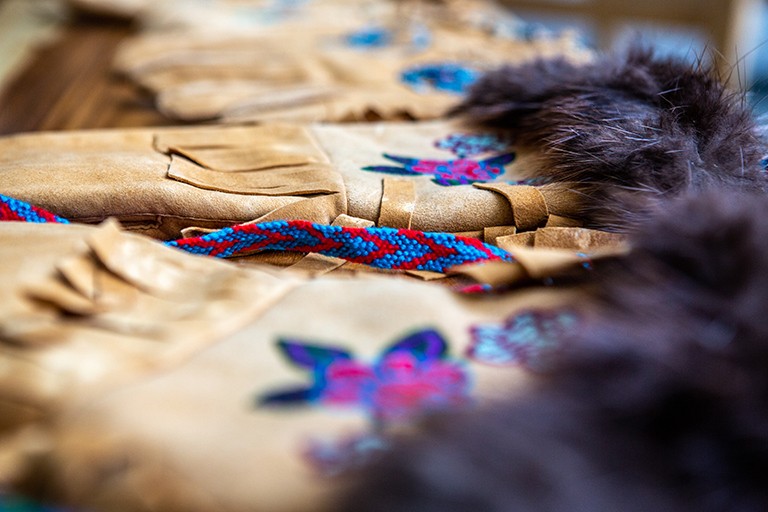Office of Indigenous Directions offers new Cree-language course to Concordia faculty, staff and students

The 2024 edition of Concordia’s Pîkiskwêtân Indigenous Learning Series kicks off on January 18 with a welcome new offering: a Cree-language workshop.
The course is the latest in the annual series organized by the university’s Office of Indigenous Directions. The non-credit course will be facilitated by Manon Tremblay, BA 03, the office’s senior director, and take place in person over 10 weeks.
Tremblay will be teaching Western Cree, an Indigenous language primarily spoken west of the Ontario border. The course’s interactive format aims to be fun.
“The workshop is open to students, faculty and staff who are interested in learning the basics of Cree. Students will perhaps also learn a little more about how our worldview is encoded in our languages,” Tremblay says.
“It’s a language course without the stress of papers and exams.”
Pîkiskwêtân means “let’s talk” in Cree. Now in its fourth year, the learning series focuses on providing the Concordia community with anti-racist Indigenous awareness training, decolonizing training and professional development.
This year’s series explores a range of topics designed to increase awareness. Courses and workshops will help participants understand the diverse cultures and sociopolitical realities of Indigenous peoples while thoughtfully and accurately conveying their experiences and perspectives.
Territorial land acknowledgements will be the focus of a workshop led by Donna Kahérakwas Goodleaf, director of decolonizing curriculum and pedagogy. The focus of this workshop is to bring awareness, knowledge and understanding about the significance of land acknowledgements within the context of place — that is, whose land universities are built on — and the implications for teaching and learning.
The workshop will also provide examples of ways that faculty can facilitate deeper, more meaningful conversations with students by engaging in critical self-reflexive practices and discourse about their relationships to Indigenous peoples and communities. It will also examine how Canadian settlers and/or guests living in the lands of the Kanien’kehá:ka nation can promote peaceful co-existence and trusting relationships.
“Participants will also learn how to make connections with land acknowledgements in their course outline and prevent ‘tokenistic’ approaches where land acknowledgements are included on course outlines without deeper engagement and critical discussions with students,” Goodleaf explains.
She says she hopes to have faculty and students leave with the knowledge, understanding and tools to engage in critical discourse around land acknowledgments, including what acknowledgements mean on a deeper level and within relationships to Indigenous peoples and communities.
Cheyenne Henry, manager of Concordia’s Otsenhákta Student Centre, will be co-facilitating a “day in the life” session with Allan Vicaire, senior advisor of Indigenous directions. The session will shed light on the many extra hats Indigenous faculty and staff wear in their roles and the impact of this added responsibility.
“I think an important consideration for Indigenous faculty and staff that is overlooked is our connections to our communities — urban and rural. Many of us consider how and what we do in our roles impacts and benefits our community,” Henry says.
“Whether with our own nation or another, keeping a relationship and connection to community is often additional work we do that directly benefits and contributes to the organizations or institutions that employ us. This work is often not recognized or valued.”
Vicaire and Carole Brazeau, Indigenous curriculum and pedagogy advisory, will co-facilitate Building Cultural Safety. This workshop will focus on respectful and effective interactions with Indigenous peoples. It will also encourage participants to be mindful of their personal values and biases.
Decolonization, Indigenization and Reconciliation: What Does it Mean and How Does it Affect Me seeks to clarify the workshop’s titular concepts. The content will also cover ways that the Concordia community can positively contribute to the university’s decolonization, Indigenization and reconciliation goals.
Politics of Indigenous Identity will showcase historical and contemporary perspectives on Indigeneity through topics such as government assimilation policies, treatment of Indigenous people in the justice system, cultural appropriation, media representation and the misappropriation of Indigenous identity.
Manon Tremblay will facilitate both workshops.
“The response to Pîkiskwêtân since its launch in 2021 has been very good, and clearly speaks to the need within the Concordia community to learn about First Nations, Inuit and Métis people,” Vicaire says.
“We’ve been expanding the offerings each year, always striving to make sure the content reflects the current realities of Indigenous peoples.”
Apart from the in-person Cree-language workshop, sessions are virtual and will be offered until mid-April.
Pursue your passion for Indigenous languages with Concordia’s First Peoples Studies program.




